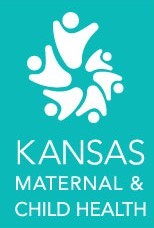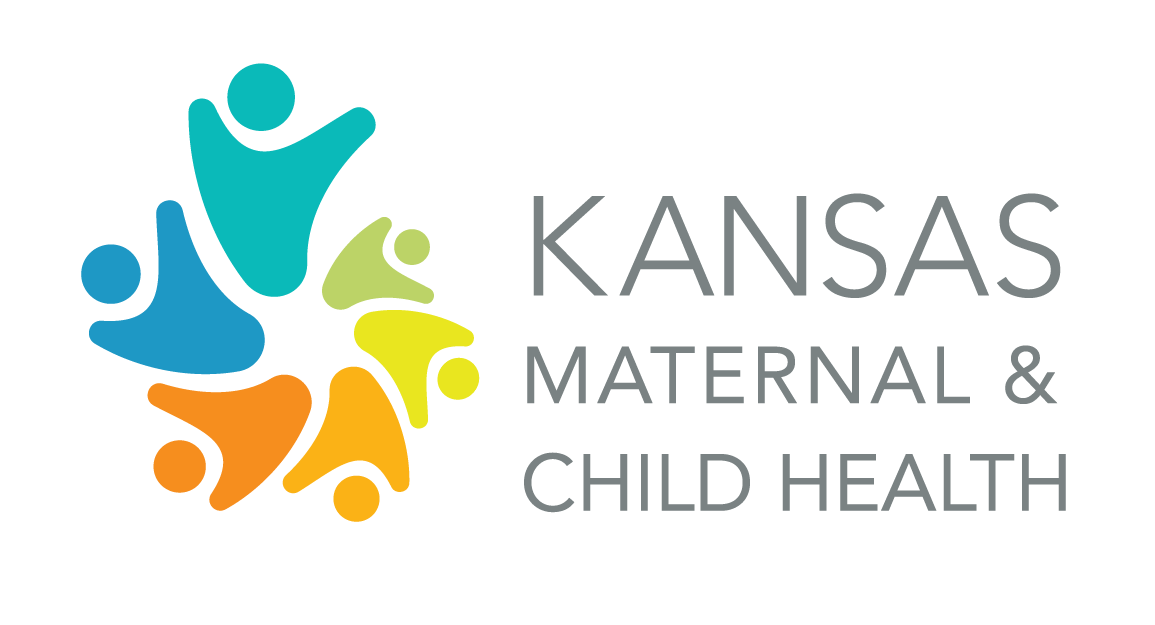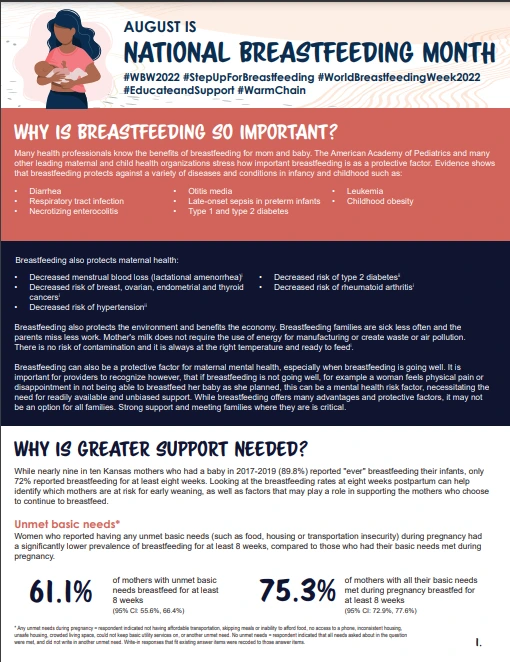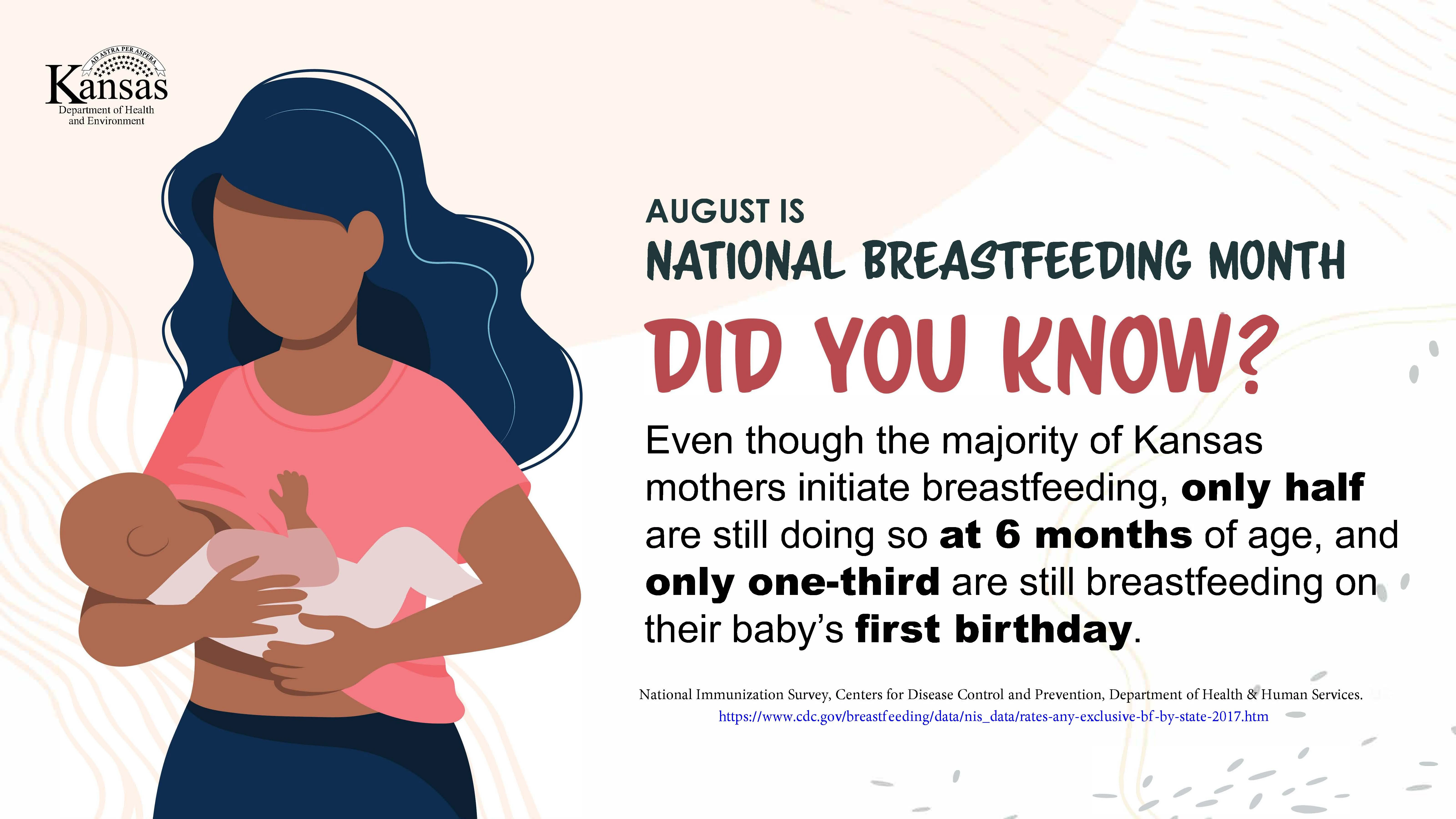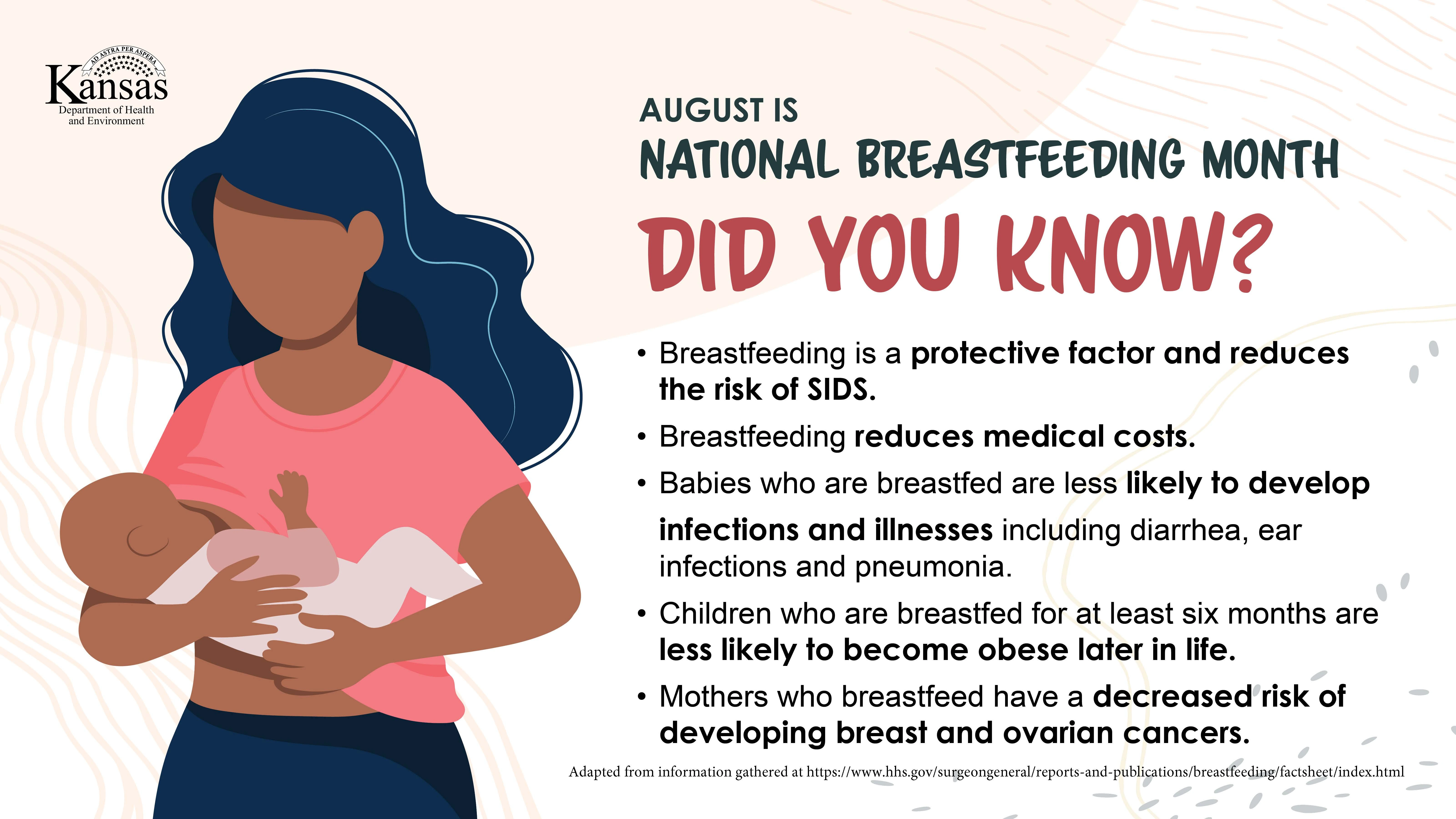August is National Breastfeeding Month! It is a great opportunity for providing extra promotion of resources and support, and taking a closer look at one's agency/organization's policies and identification and addressing of disparities as they relate to breastfeeding.
Included in this action alert are statistics, tips for actions providers can take, provider and patient resources including access to a directory of local resources, resources specific to National Breastfeeding Month and pre-made social media posts. Below, you can download the social media graphics and copy the messages to share on your social media platforms, and find the links to all resources listed in the action alert.
We hope that you find these resources helpful and will put them to good use! And please feel free to share this action alert and its resources with your community partners to help spread this messaging to a broader audience
View the full action alert PDF, share the Social Media Graphics and Messages below, and check out the list of Resources!
Social Media Graphics and Messages
1. Did you Know?
Caption: Even though the majority of Kansas mothers initiate breastfeeding immediately following the birth of their baby, only half are still doing so at 6 months of age, and only one-third are still breastfeeding on their baby's first birthday. Research shows that support is key to helping women achieve longer durations of breastfeeding! Becoming a Mom® classes, WIC breastfeeding peer counselor appointments, and La Leche League meetings are a great way for parents to establish support and get valuable information both before and after the birth of their baby.
For more information about Becoming a Mom®: https://www.kdhe.ks.gov/588/Participating-Communities
2. Everyone can support breastfeeding in Kansas!
Caption: Having support from friends, family, childcare providers, local businesses, and employers can make all the difference to a breastfeeding family. Whether dropping off a meal, supporting her choice to feed her baby in a public space, or providing adequate breaks and space to pump during work time, a little bit of support goes a long way towards helping families to meet their breastfeeding goals. For more ideas on how to be a great breastfeeding support, check out the CDC's "Guide to Support Breastfeeding Mothers and Babies" here: https://www.cdc.gov/breastfeeding/pdf/bf-guide-508.pdf
3. It takes a village!
Caption: Mothers who receive support during their pregnancy and after giving birth are more likely to breastfeed, and to continue breastfeeding for longer periods of time. There are many resources available to families, including in-person support groups and virtual tools to troubleshoot problems. For a list of resources in your community, as well as links to verified online support, visit the Kansas Breastfeeding Coalition's webpage located at ksbreastfeeding.org/resource-library/ or contact your local health department.
4. Breastfeeding your baby reduces medical costs
Caption: Breastfeeding has many benefits for the health of both mom and baby!
- Breastfeeding is a protective factor and reduces the risk of SIDS
- Babies who are breastfed are less likely to develop infections and illnesses including diarrhea, ear infections, and pneumonia
- Children who are breastfed for at least six months are less likely to become obese later in life
- Mothers who breastfeed have a decreased risk of developing breast and ovarian cancers
Adapted from information gathered at https://www.hhs.gov/surgeongeneral/reports-and-publications/breastfeeding/factsheet/index.html
5. Why do mothers stop breastfeeding?
Caption: According to the CDC, 60% of mothers stop breastfeeding earlier than they planned. There are many factors that go into a mother's decision to stop breastfeeding her baby, including:
- Worry about baby getting enough milk
- Lack of support from family or friends
- Unsupportive workplace or child care
- Embarrassment feeding in public
- Lack of knowledgeable health care providers
Community support matters! For information about resources available in your community, contact your local health department or visit ksbreastfeeding.org/resources/
Adapted from information found at https://www.cdc.gov/breastfeeding/resources/calltoaction.htm and https://www.cdc.gov/breastfeeding/data/facts.html
Resources
- Breastfeeding Awareness Week/Month Specific
- 2022 Theme: Toghether We Do Great Things!
- Weekly Themes and Resources:
- Week 1 (August 1-7): World Breastfeeding Week Theme: Educate & Support
- Week 2 (August 9-15): Indigenous Milk Medicine Week Theme: Strengthening Our Traditions From Birth and Beyond
- Week 3 (August 16-24): Asian American Native Hawaiian and Pacific Islander Week Theme: Telling Our Own Stories, Elevating Our Voices.
- Week 4 (August 25-31): Black Breastfeeding Week Theme: BBW 2022: 10 Years, A New Foundation
- NICHQ NBM 2023 Toolkit
- Patient/Client Resources
- Kansas Breastfeeding Coalition
- La Leche League USA - Breastfeeding Information / Parent Education
- La Leche League International - Breastfeeding Resources and Support
- Kellymom - Breastfeeding Resources
- Kansas WIC - Breastfeeding Resources
- Office on Women's Health - Breastfeeding Resources
- Provider Resources
- Kansas Breastfeeding Coalition
- Resources - includes: local resource directory; patient education handouts; podcasts; position statements and policies; professional organizations
- Physician specific resources
- Educational Opportunities - includes education for: child care providers; community supporters; healthcare professionals; parents; education events - past and upcoming; education courses
- Kansas Chapter American Academy of Pediatrics - Breastfeeding Resources - includes: how to have a Breastfeeding Friendly Practice; coding for breastfeeding; model policy; statements and clinical protocols; educational opportunities
- Center for Disease Control (CDC) Breastfeeding Resources Library - Fact Sheets and Infographics
- Cross-Sector Initiatives/Tools
- Warm Chain of Support for Breastfeeding - Campaign that strives to link different actors across the health, community and workplace sectors to provide a continuum of care during the first 1000 days
- Kansas Breastfeeding Coalition
